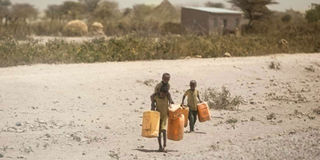It's a harsh world for children amid unpredictable weather changes

A new report from the medical journal, The Lancet, reveals that the health effects of climate change will be unevenly distributed and children will be among those especially harmed. PHOTO | FOTOSEARCH
Children in Kenya and throughout Africa will be among those most affected by the rise in infectious diseases if nothing is done to limit emissions so that increases in global temperatures remain “well below two degrees Celsius”.
A new report from the medical journal, The Lancet, reveals that the health effects of climate change will be unevenly distributed and children will be among those especially harmed.
It shows children are particularly vulnerable to malnutrition.
This is because crop yield potential has reduced in Kenya for all major crops tracked. For example, since the 1960s, crop yield potential in Kenya has reduced by 6.4 per cent for maize, 1.5 per cent for winter wheat, 1.1 per cent for spring wheat and 15 per cent for rice.
“With its high rates of healthcare inequality, poverty and food insecurity, the health effects of climate change are going to be felt strongly across Africa,” says Nick Watts, Executive Director of The Lancet Countdown.
According to the report, dengue and malaria will spread into new areas, a more hostile climate will continue to threaten food security, and without immediate action, climate change will come to define the health of an entire generation.
“For example, the ability of one type of mosquito to transmit dengue fever in Kenya has increased by 20 per cent since the 1950s as a result of a changing climate,” the report shows. It further indicates that climatic suitability for the transmission of malaria continues to increase in highland areas of Sub-Saharan Africa such as Nairobi, which are among the most densely populated agro-climatic zones in Sub-Saharan Africa.
“In Kenya, 86 million potential labour hours were lost due to heat exposure on average in 2015-2018. This is a five-fold increase with respect to the average for 2000-2003. Of these hours, some 98 per cent were lost in the agricultural sector,” the report shows.
LIMIT TEMPERATURES
The Lancet Countdown on Health and Climate Change, a comprehensive yearly analysis tracking progress across 41 key indicators, demonstrates what action to meet Paris Agreement targets means for human health.
Three key messages emerging from the report are that the life of every child born today will be profoundly affected by climate change, with populations around the world increasingly facing extremes of weather, food and water insecurity, changing patterns of infectious disease and a less certain future.
The study says without accelerated intervention, this new era will come to define the health of people at every stage of their lives.
However, it gives hope by stating that it is still possible to limit the global average temperature rise to well below two degrees Celsius which will ensure cleaner air, safer cities and healthier diets.
Further, the report shows that in order to limit temperature rise, bold new approaches to policymaking, research and business will be needed. “It will take the work of many of the 7.5 billion people currently alive to ensure the health of a child born today is not defined by a changing climate,” reads the report.
Rosemary Sang, a scientist at Kenya Medical Research Institute, who has closely studied climate-driven diseases endemic to Kenya, says the report shows the importance of including African perspectives in global surveys of climate change impacts.
“Past and current economic activities in the West are likely to affect Africa’s future for decades to come. We cannot afford to wait on the sidelines for the right decisions to be made; we must lend our voices to those calling for urgent action now,” she says.
MENTAL HEALTH
In addition to the emissions associated with burning fossil fuels, the report says future generations would be exposed to a growing source of fine-particulate pollution: wildfires. As temperatures rise, wildfires are becoming more frequent in part because hotter temperatures dry out vegetation, making it easier to ignite.
The smoke, like the smoke that comes from burning fossil fuels, has negative health effects.
The report shows there are many links between climate change and mental health, including the loss of property and the loss of livelihoods, but stopped short of quantifying the impact.
The project is a collaboration between 120 experts from 35 institutions including the World Health Organisation, World Bank, University College London and Tsinghua University.
International Livestock Research Institute, however, helped engage with different food systems and food security parts of Lancet Countdown’s work, helping disseminate its message to Kenyan audiences.



